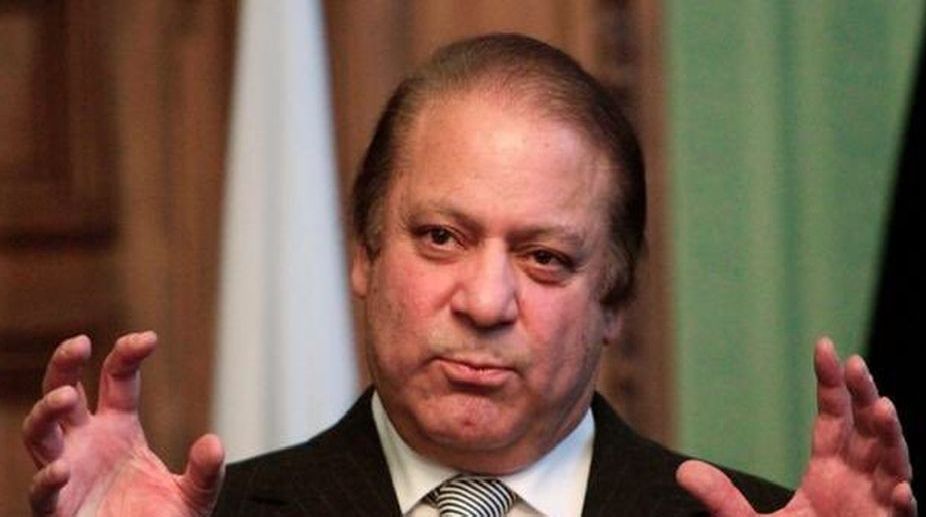Prime Minister Nawaz Sharif has a kidney stone. It is his second. The first is an equally painful obstruction called Imran Khan.
This latest disclosure of the prime minister’s medical problems has released yet another flurry of snowflake speculation. These will soon melt, as have all previous prognoses about his imminent departure on health grounds. Nawaz Sharif has no intention of quitting his post. As long as there is a country to be visited (even if it is Ruritania), a guard of honour to be inspected, a photo-op with a head of state to be had, another framed trophy to be added to the galaxy of dignitaries grinning from the walls of his Raiwind estate, he will preserve his fitness — in the supreme national interest.
Advertisement
His peripatetic travels have shown that nothing is as dear to him as the cause of international diplomacy. One suspects he has made more visits abroad than appearances on the floor of the National Assembly. MNAs are less familiar with his features than foreign hosts are.
One should not cavil about his obsessive interest in foreign policy. He is no different to any other leader of our hapless country. To them, foreign policy is a synonym for a personal insurance policy.
For example, haven’t the Sharif brothers been rescued repeatedly by Saudi largesse and Qatari amnesia? Doesn’t Altaf Hussain continue to enjoy the hospitality of the United Kingdom? Doesn’t former president Asif Zardari feel more at home in Dubai than in Karachi? Even their nemesis, retired Gen Musharraf, feels no embarrassment admitting that the plush property in London was a personal gift from a Saudi monarch. Nor does he blush when he discloses that organisers of lecture tours in the United States are eager to pay him $150,000 a pop for the sort of vacuous speeches he gave for free as president.
Musharraf has followed the example of illustrious names like Tony Blair, Margaret Thatcher and Ronald Reagan who charged enviably high fees after they left office. One recent Pakistani ambassador to the US took pains to hair-split his windfall income as a speaker. He drew a distinction between the fees he received when speaking as an ambassador from those he pocketed when speaking his mind. Needless to say, such talent did not go unnoticed in a country that appreciates innovation and initiative.
The most recent example of such lucrative diplomacy is the sinecure the Saudis have offered former Chief of Army Staff Gen Raheel Sharif. After plucking petals for days — ‘Should I? Shoudn’t I?’ — he reached the final one. He decided to head the Saudi-led 39-nation coalition. The impression is that it is not against Yemen but against terror/the militant Islamic State group/Iran. Never has the ummah stood so united against an enemy of fellow Muslims.
Last week, it was reported that a spokesman for the coalition, the Saudi general Ahmed Asiri, while visiting the UK had an egg thrown at him. Many Pakistanis might feel that the former COAS in accepting this appointment in Saudi Arabia, has smeared egg on the face of the nation.
It was not all that long ago that the Pakistani people through their representatives in parliament voted against joining this coalition. Of course, it will be argued that permission to Gen Raheel Sharif has been granted by the competent authority. Authority does not presume competence, nor propriety. What will never be assuaged are the feelings of Pakistanis at this inexplicable volte face, this self-serving acceptance of a gilded sinecure.
One is reminded of the anguished words of remonstrance written by Queen Mary to her son King Edward VIII, after he announced his abdication in 1936. Even though they were written 80 years ago and in a different context, they are still poignantly applicable: “You did not seem to be able to take any point of view but your own”, she told her love-smitten son. “It seemed inconceivable to those who had made such sacrifices during the war that you, as their King, refused a lesser sacrifice.” Countless Pakistani martyrs have made the ultimate sacrifice for their country. It is sad that our leaders find it impossible to make lesser sacrifices.
There may come a time when foreign policy will be transacted in the interest of the nation, not in the personal interest of rulers. There may come a time when the National Assembly and the provincial assemblies shall be treated by elected representatives as the dock of accountability, not as a springboard of unbridled opportunity, nor as pulpits of feigned piety. There may come a time when the dignity of service is regarded as its own reward. Until then, Pakistan is being treated like some Masai cow: milked daily and bled to sustain its ravenous masters.
Dawn/ANN.











